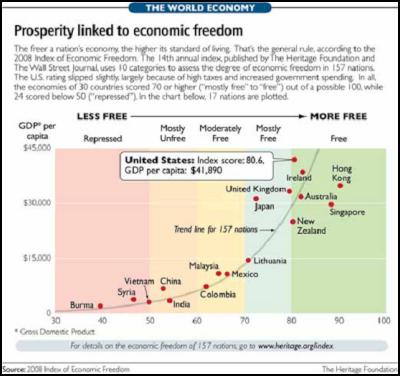Economic Freedom: New Zealand Losing Ground
Please find attached a Business Forum column that appeared in the Dominion Post today, 11 February 2008.
Economic
Freedom: New Zealand Losing Ground
Economies with higher levels of economic freedom enjoy higher living standards.
This insight in economics goes back at least to Adam Smith’s The Wealth of Nations, which argued that basic institutions that protect the freedom of individuals to pursue their own economic interests while constraining anti-social behaviour result in greater prosperity for the larger society.
Contemporary research confirms that free institutions create an environment that allows a virtuous cycle of entrepreneurship, innovation and sustained economic growth to flourish. The freest economies also tend to have lower rates of unemployment and lower inflation.
For over a decade, two North American thinktanks, the US Heritage Foundation (in association with the Wall Street Journal) and the Fraser Institute in Canada have compiled indexes measuring economic freedom in a number of dimensions.
The 2008 Heritage/WSJ Index appeared this year in January; the Fraser Institute one will appear in September. Over the years, both indexes have painted a similar but not identical picture.
The Heritage/WSJ Index grades countries on 10 criteria: business freedom, trade freedom, fiscal freedom, government size, monetary freedom, investment freedom, financial freedom, property rights protection, freedom from corruption and labour freedom.
As illustrated in the nearby chart, the Index reports that the freest 20% of the world’s economies have twice the per capita income of those in the second quintile and five times that of the least-free 20%.
For 2008, Hong Kong-China retains its position as the world’s freest economy. Singapore, often wrongly thought of as a government-run country, remains in second place. Ireland and Australia have climbed the ladder in recent years and are now in third and fourth place, followed by the United States.
New Zealand has slipped in the latest Index from its third position in 2004 to sixth place. Indeed in the past year its overall economic freedom score has fallen further than that of all but one country in the top 20. Falls have occurred in five of the 10 freedom categories.
The commentary notes that following two decades of sound economic policies and structural reforms, New Zealand transformed itself into a modern, flexible economy with one of the lowest unemployment rates in the OECD. However, in terms of economic freedom it has basically flatlined since the mid-1990s and fallen back somewhat in recent years. It scores particularly poorly for the size of government; the commentary notes that both total government expenditures and tax rates are high.
The freedom indexes are a much more comprehensive indicator of a country’s economic health than the World Bank’s annual Doing Business survey. This looks at the ease of doing business in a country, and government ministers have often pointed to the fact that New Zealand has been in second place after Singapore. The Heritage/WSJ Index confirms that New Zealand scores exceptionally well for business freedom, but it is only one of the 10 categories of the Index.
Moreover, the World Bank’s survey focuses only on regulations affecting things such as starting and closing a business, dealing with licences, registering property and enforcing contracts (these are particularly relevant to developing countries). The Bank acknowledges that other issues important to business, many of which are covered in the freedom indexes, such as government spending and taxation, the quality of infrastructure, many regulations, and the underlying strength of institutions, are not included in its coverage.
The freedom indexes line up reasonably well with the World Economic Forum’s Global Competitiveness Report. The latest Report had New Zealand falling to 24th place and ranked it poorly (40th place or worse) for wastefulness of government spending, burden of government regulations, quality of overall infrastructure and extent of taxation, among other things.
What should we make of all this? The overall picture is that New Zealand has a much better economy than it had 20 years ago, but that it has been losing ground in terms of economic freedom and competitiveness.
Moreover, a commitment to freedom has to be maintained. As Wolfgang Kasper noted in a report card on New Zealand’s economic reforms (www.nzbr.org.nz), countries need to stay on a consistent path, not a stop, go and reverse one, in order to sustain investment certainty and confidence. Moreover, social incentives (for example those arising from tax and welfare policies) must be aligned with economic incentives to encourage productive effort.
The costs of policy changes that reduce economic freedom and competitiveness often show up only with long lags.
New Zealand’s trend rates of productivity and GDP growth have been sagging at a time when the economy should have been booming, given record terms of trade. The indexes have signalled accurately that New Zealand has been making policy changes in the wrong direction and the outcomes are no surprise.
Roger Kerr is the executive director of the New Zealand Business Roundtable.

Click to enlarge
ENDS


 Gaurav Mittal, IMI: How Can We Balance AI’s Potential And Ethical Challenges?
Gaurav Mittal, IMI: How Can We Balance AI’s Potential And Ethical Challenges? Science Media Centre: Several US-based Environmental Science Databases To Be Taken Down – Expert Reaction
Science Media Centre: Several US-based Environmental Science Databases To Be Taken Down – Expert Reaction Consumer NZ: Despite Low Confidence In Government Efforts, People Want Urgent Action To Lower Grocery Bills
Consumer NZ: Despite Low Confidence In Government Efforts, People Want Urgent Action To Lower Grocery Bills NZ Banking Association: Banks Step Up Customer Scam Protections And Compensation
NZ Banking Association: Banks Step Up Customer Scam Protections And Compensation The Reserve Bank of New Zealand: CoFR Seeking Feedback On Access To Basic Transaction Accounts
The Reserve Bank of New Zealand: CoFR Seeking Feedback On Access To Basic Transaction Accounts 2Degrees: Stop The Pings - Half Of Kiwis Overwhelmed By Notifications
2Degrees: Stop The Pings - Half Of Kiwis Overwhelmed By Notifications



